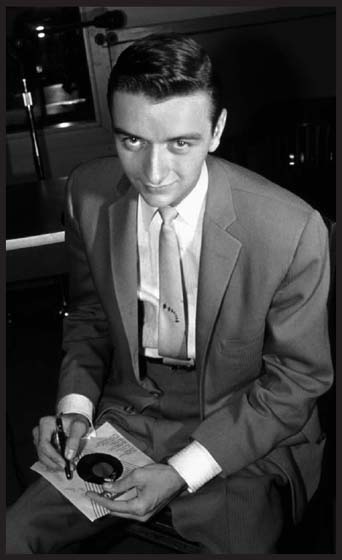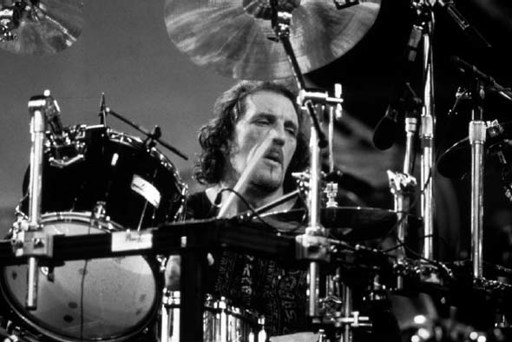The Encyclopedia of Dead Rock Stars (276 page)
Read The Encyclopedia of Dead Rock Stars Online
Authors: Jeremy Simmonds

A keyboardist with a good line in dramatic fills, Ron ‘Have Mercy’ Kersey became part of the fixtures and fittings at Philadelphia International – the label that blended soul and dance to such fine effect during the seventies. Kersey developed his nickname while a member of the Massachusetts air force band, the audience loving his stage presence and relentless energy. A meeting with Philly legend-to-be Norman Harris elevated the musician to a higher plane, however: having played mainly in the studio with the largely faceless Salsoul Orchestra, Kersey then produced his finest work – and found an outlet for his exuberant personality – with The Trammps (formerly The Volcanos/Moods). Most US fans remember this great band solely for the
Saturday Night
^”ever-housed ‘Disco Inferno’ (1977), but there were other pulsating hits such as ‘Zing Went the Strings of My Heart’ (1974) and ‘Hold back the Night’ (1975 – a UK Top Five hit). But such was the glut of black dance acts at the time, The Trammps – Kersey, Earl Young (vocals), Jimmy Ellis (vocals), Dennis Harris (guitar), Stan Wade (bass), John Hart (organ) and Michael Thompson (drums) – were never to achieve the level of fame that they clearly should have.
Ron Kersey maintained a sizeable income afterwards by writing, arranging and producing the likes of Gloria Gaynor, Grace Jones, B B King, Gladys Knight and even Stevie Wonder. His days were numbered, however, following a stroke in 1997. Kersey’s final years were spent under the care of his sister Toni, before being carried off by a bout of pneumonia.
Sometime Trammps member and producer Ronnie Baker passed on in 1990, with John Hart dying of heart failure in April 2008.
Golden Oldies #23
Ray Peterson
(Denton, Texas, 23 April 1935)

‘The Golden Voice of Rock ‘n’ Roll’ was, in truth, more balladeer than rocker -but a pretty impressive one, boasting a four-and-a-half-octave range. Ray Peterson overcame the polio that killed some of his classmates to become a respected singer and even a golf pro in his later life, the future star developing his voice by entertaining fellow patients as he received treatment for his condition. Hit status was not quick in arriving but, with his seventh release, Peterson took ‘The Wonder of You’ (1959) into the US and UK charts in a rendition that prompted Elvis Presley to record the song himself and score a 1970 UK chart-topper. Peterson’s best-known hit was Jeff Barry’s classic death ditty ‘Tell Laura I Love Her’ (1960) ( Death Toll
Death Toll
#1) , though yet again, the song - subject to a ban by some US states - was destined to be better recalled as a British number one for Welshman Ricky Valance. Working with Phil Spector, Peterson achieved another US Top Ten hit that year in ‘Corinna Corinna’, but future recordings under the young maverick producer were less noteworthy - and failed to impact upon the business end of the hit parade.
Peterson founded his own Dunes record label with agent Stan Shulman in 1961, but the cabaret circuit became his performing environment for the next two decades, with ‘Laura’ remaining a staple in Ray Peterson’s act until his retirement. On 25 January 2005, the much-admired star died from cancer at home in Smyrna, Tennessee.

Ray Peterson perhaps finds another way of telling Laura

Jim Capaldi: Caught up in Traffic
Friday 28
Jim Capaldi
(Nicola James Capaldi - Evesham, Worcestershire, 2 August 1944)
Traffic
(The Hellions/The Revolutions/Deep Feeling)
(Various acts)

The son of an Italian music teacher, Jim Capaldi probably felt his given name wasn’t ‘rock ‘n’ roll’ enough to suit his own forays into the business. His father encouraged Capaldi in his attempts to master the drums, although it was clear the young boy had considerable talent even at the age of twelve. As a teenager, Capaldi became a well-established though still very fresh face on the Worcester music scene, forming his first band, The Sapphires, in 1961; two years on, he met guitarist Dave Mason and started up The Hellions – an oft-renamed band that was to form the basis of Traffic. The major breakthrough for Capaldi arrived as The Hellions went to Hamburg – a noted destination for would-be British stars – as backing musicians to singer Tanya Day. (Also in tow were The Spencer Davis Group – months away from their brief but spectacular success in the UK – Capaldi and Mason befriending the band’s wunderkind singer, Steve Winwood.)
The Hellions (later The Revolutions/Deep Feeling) becoming something of a local legend, Capaldi – who had also tried his hand successfully as vocalist – played with another friend, Jimi Hendrix, before reconvening with Winwood to fashion Midlands-based psychedelic supergroup Traffic at the start of 1967. The band (completed by flautist/saxophonist Chris Wood) achieved instant success with the great Top Five singles ‘Paper Sun’ and ‘Hole in My Shoe’, plus the hit debut album
Mr Fantasy.
The group was forever wracked by personnel upheaval, however, with pretty much all members leaving at one point or another to start other projects. In Capaldi’s case, it was Wooden Frog, an aborted sideline affair that occurred only when Winwood disappeared to work with Blind Faith in 1968. Somehow, the nucleus of Traffic rallied to release two of their best albums,
John Barleycorn Must Die
(1970) and
The Low Spark of High-Heeled Boys
(1971), by which time the hit singles had dried up. Simultaneously, Capaldi embarked on a reasonably successful solo career that spawned the acclaimed album
Oh How We Danced
(1972) and later even included a couple of UK chart hits in ‘It’s All up to You’ (1974) and, most notably, a Top Five cover of Roy Orbison’s ‘Love Hurts’ (1975). Over the course of the next three decades, Capaldi issued twelve albums of his own, recording with some serious names, including Eric Clapton, George Harrison, Bob Marley and Carlos Santana. Traffic –
sans
Wood, who had died ten years before
( July 1983)
July 1983)
– even joined in with the fine comeback,
Far From Home
(1994), that saw Capaldi tour once again with Winwood.
Jim Capaldi will always be remembered as a selfless individual, unspoiled by rock fame and ever ready to assist others. The environmentally conscious musician had married his Brazilian girlfriend Aninha in 1977, moving to South America where he became active in ecological issues and also his partner’s Jubilee campaign to assist Brazil’s thousands of street children. Capaldi remained involved with these projects (as well as another prospective Traffic reunion following the band’s 2004 induction into the Rock ‘n’ Roll Hall of Fame) until struck down by the stomach cancer that was to claim his life early on the morning of 28 January 2005.
See also
Rebop Kwaku-Baah ( January 1983)
January 1983)